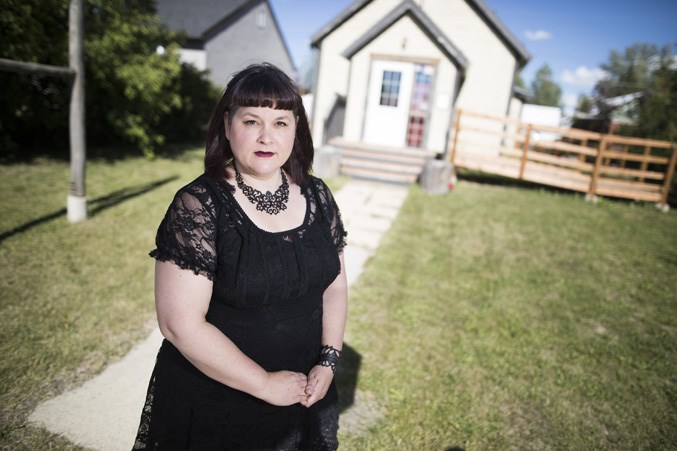Changes to rules surrounding the sale of cannabis still has a potential shopkeeper concerned about what this means for future stores. Black Diamond Town council approved changes to its draft land-use bylaw for cannabis retail shops on July 18 so it no longer requires them to abide by crime prevention guidelines. The amendment now reads that cannabis stores “may incorporate crime prevention through environmental design (CPTED) principles and the entire site on which it is located.” Danielle French, who hopes to open a cannabis shop at 306 Government Road, said while it’s a step in the right direction she questions how it will be determined which of the principles may be applied to the development permit application process for retail cannabis stores. “I appreciate that it’s changing from a ‘must’ to a ‘may’ but my concern is at whose discretion is this arbitrarily decided,” she said last week. “It’s not a concrete thing I can base my application on. How do they decide and who gets to decide and does the development officer have the final say in that?” Crime Prevention Through Environmental Design (CPTED) is a multi-disciplinary approach to deter criminal behaviour through environmental design — such as proper lighting, trees not blocking sightlines and bulletproof glass. With parking only in the back, French said her business application will not meet one of the conditions of the environmental design. She expressed these concerns to council at its July 4 meeting. “I was told my parking won’t be sufficient because it’s in the back of the building,” she said. “It makes me ineligible right off the bat.” French said she feels the bylaw is biased and that the CPTED principles should be removed entirely so as to not place needless additional restrictions that apply only to cannabis stores. “I don’t think we should be discriminated against because of the nature of the store,” she said. “We have two pharmacies that carry narcotics and their parking is in the back and they don’t have bulletproof glass. I’m trying to draw parallels.” Black Diamond Mayor Ruth Goodwin said the Town is only dealing with cannabis laws, which has nothing to do with pharmacies. “They are not the same as a cannabis or liquor store,” she said. “Liquor stores have regulations, stores that sell tobacco have regulations.” Changing the wording around the CPTED principles allows room for flexibility, said Goodwin, adding all applications will initially go through the Municipal Planning Commission for review. She said the bylaw can change following the passing of legislation to legalize marijuana, which is scheduled for Oct. 17. “It’s just the beginning as we go through the first couple of years,” said Goodwin. “We wanted to make sure that we had some flexibility there.” Goodwin said she’s happy with how administration and council is preparing for this fall’s upcoming legislation. “I think our administration has done really well with the amount of time with developing it and moving forward and working with the town of Turner Valley,” she said. “We’re fully aware that as we move through dealing with the applications and anything else that may come up and get input from both the applicants as well as the residents that if we need to make amendments and something more clear that we’ll be able to do that.” Highlights of the draft bylaw include that cannabis stores must be at least 100 metres from school and provincial health facility properties and cannot be open past 10 p.m. Administration collected input from 136 people in an online survey last spring for direction to create the land-use bylaw. Among the questions asked was what locations are best suited for cannabis stores. Sixty-four per cent of those surveyed said central areas and 61 per cent responded service commercial areas and business parks. When asked what the minimum distance should be between cannabis stores and public facilities, 59 per cent responded it should remain within the 100m provincial guideline while 31 per cent said 300m and 13 per cent 200m. As for the satisfactory distance between cannabis retail stores and outdoor public places, 31 per cent stated they don’t see a need, 31 per cent said 300m, 28 per cent said 100m and 10 per cent said 200m. When asked which public places should allow cannabis use, 41 per cent responded parks, pathways and the river valley, 34 per cent said any outdoor public place, 31 per cent said on the street and 29 per cent responded in designated areas in eating and drinking establishments. As for outdoor concerts, 39 per cent said use should only occur in designated areas at adult only events, 31 per cent said unrestricted at adult events and 26 per cent said in designated areas at family events. Twenty one per cent responded it should be banned at adult events and 42 per cent said it should be banned at family events. When asked how the Town should address cannabis-related concerns on private property, 58 per cent said similar to the excessive noise bylaw and 39 per cent said the Town should not respond.




.JPG;w=120;h=80;mode=crop)